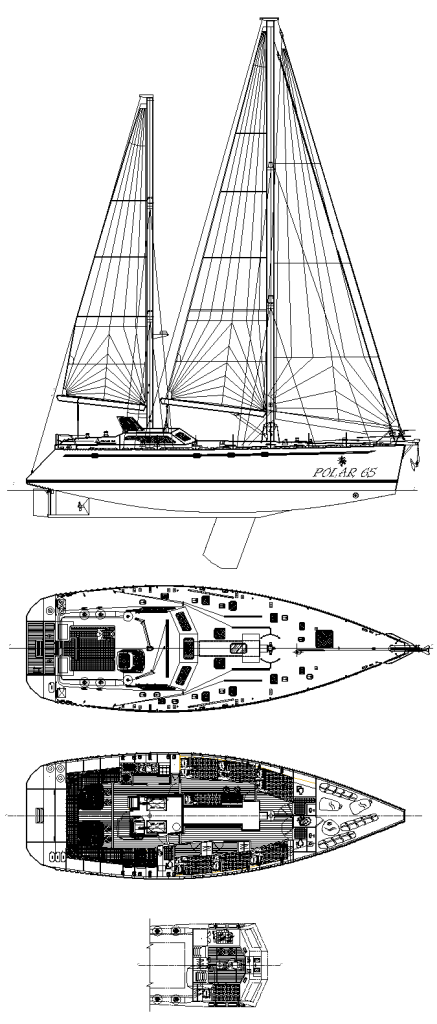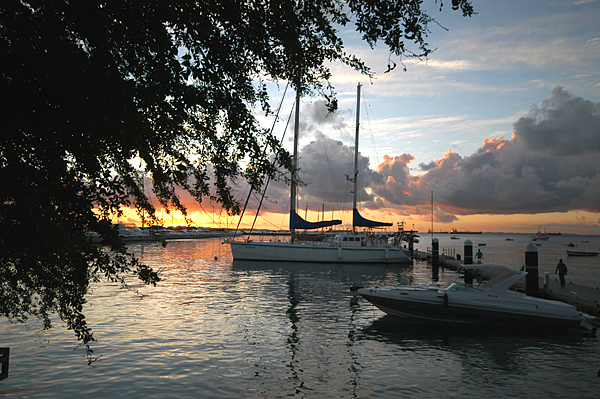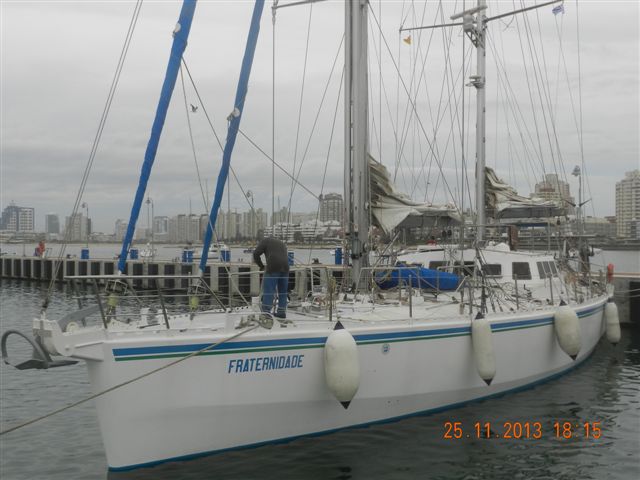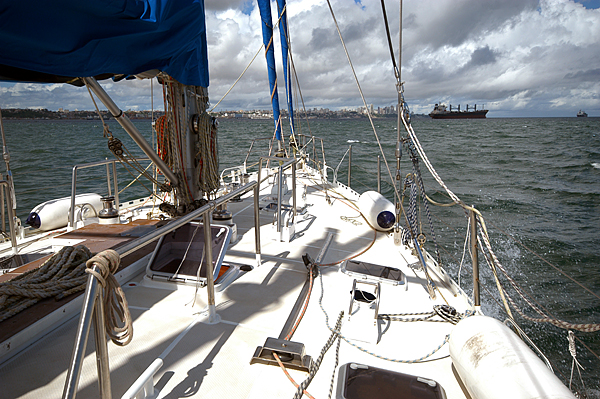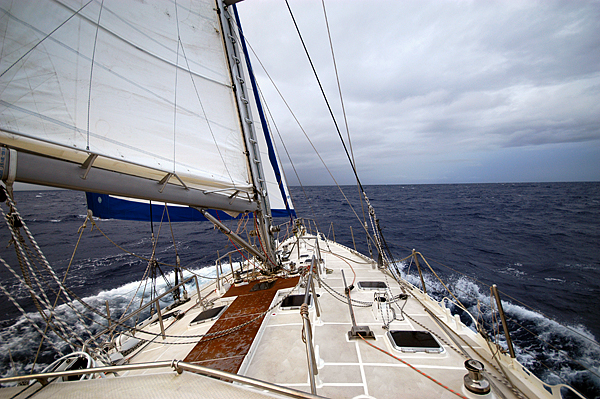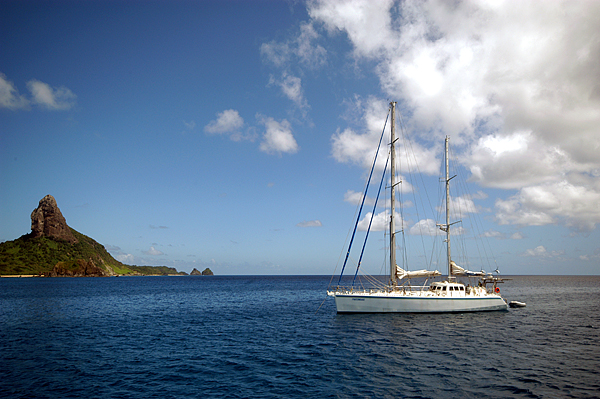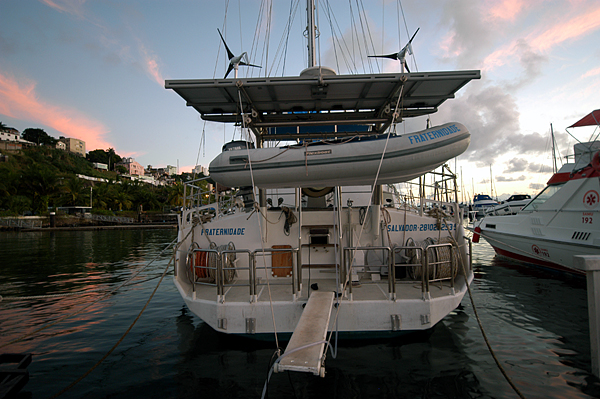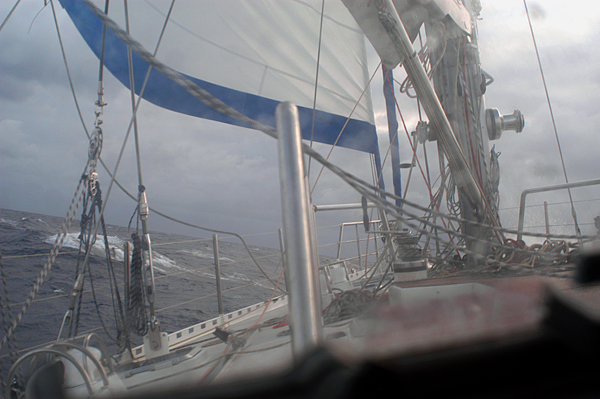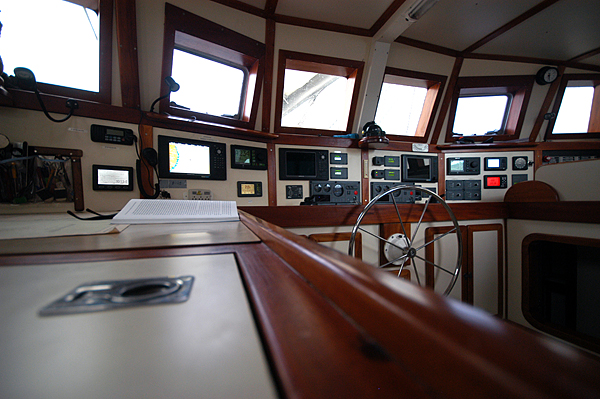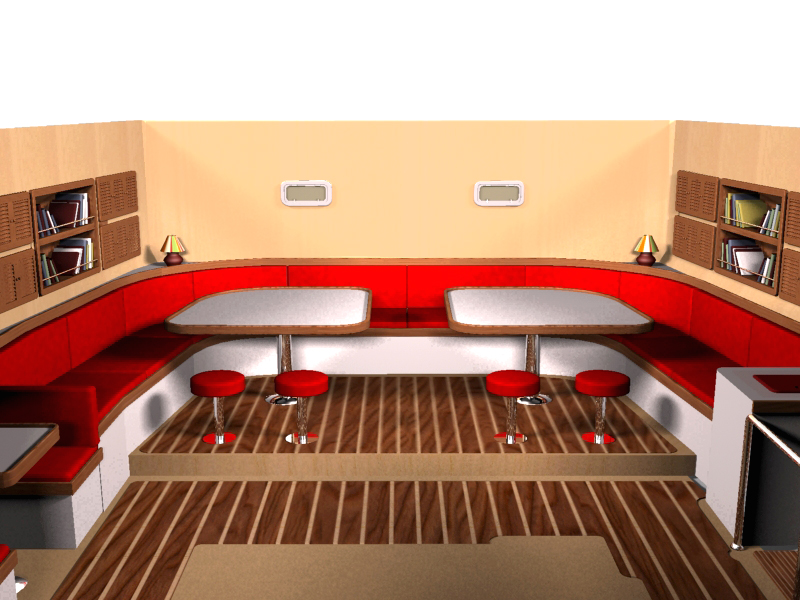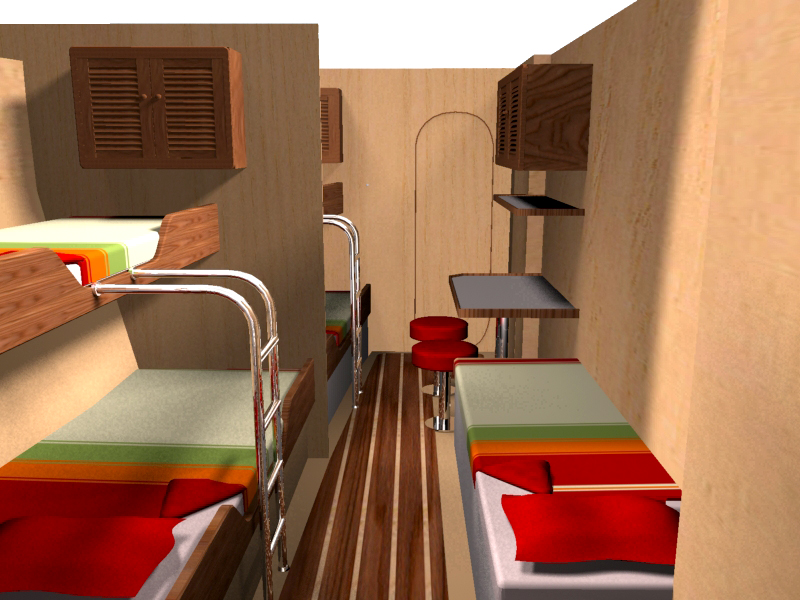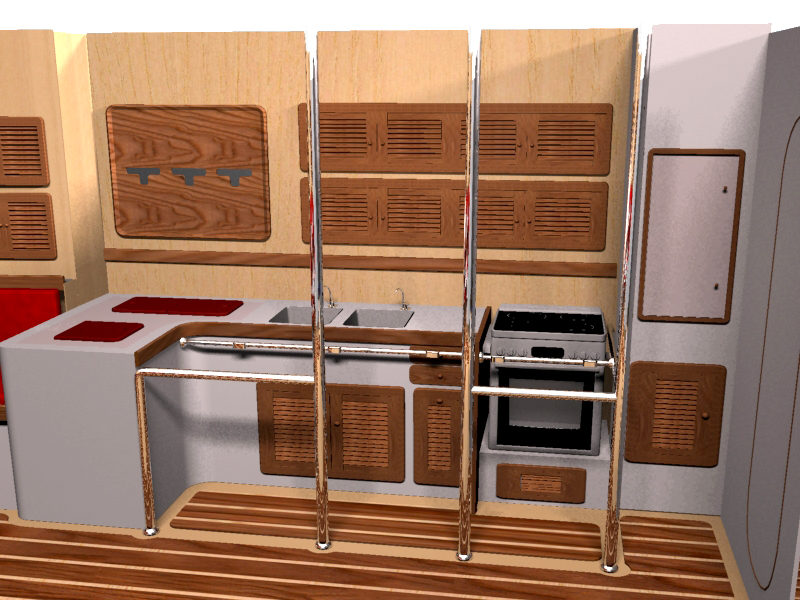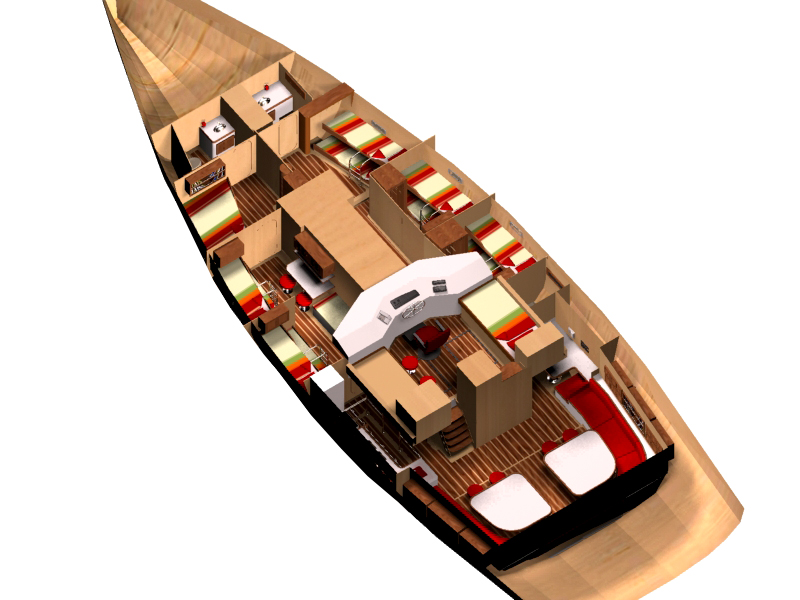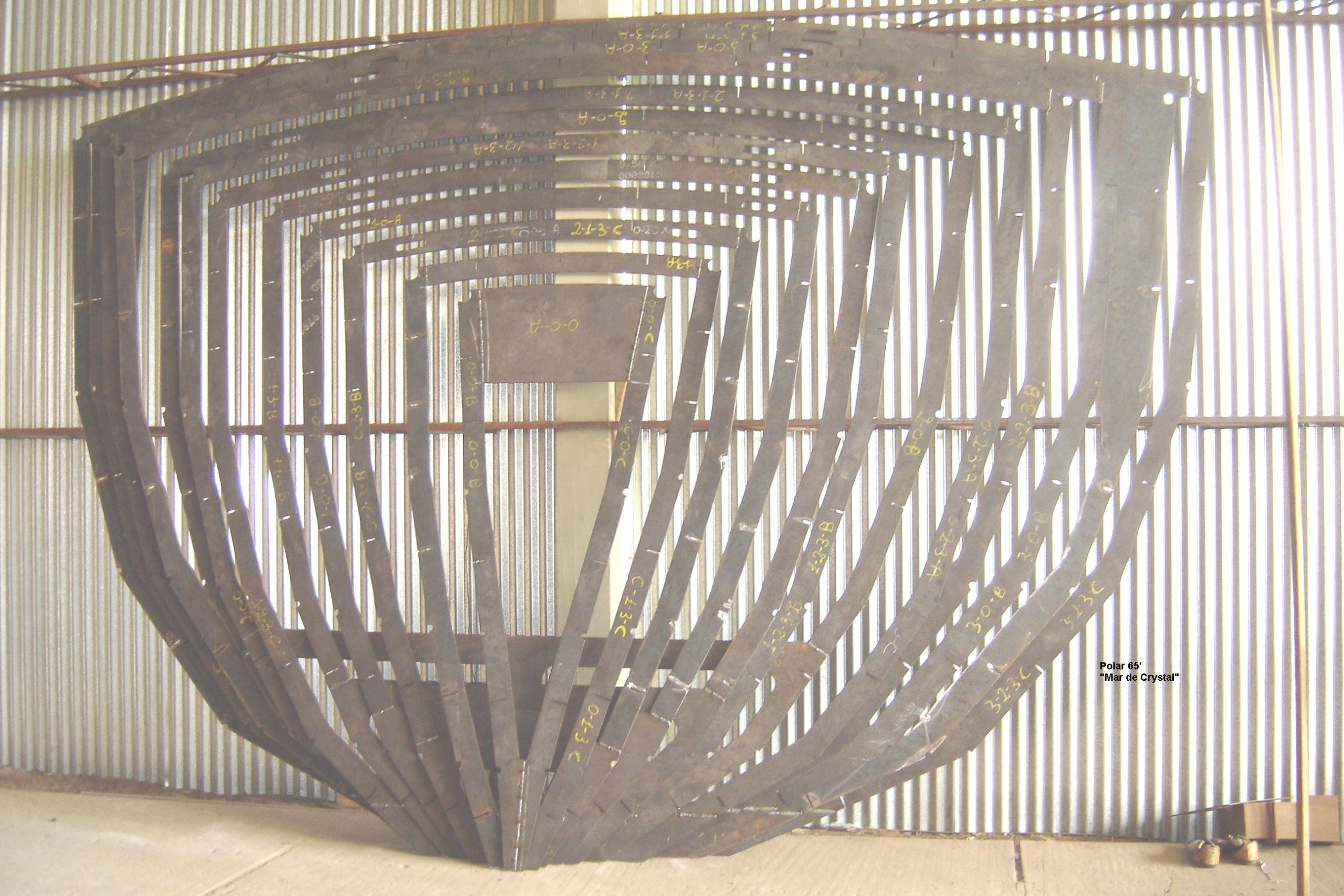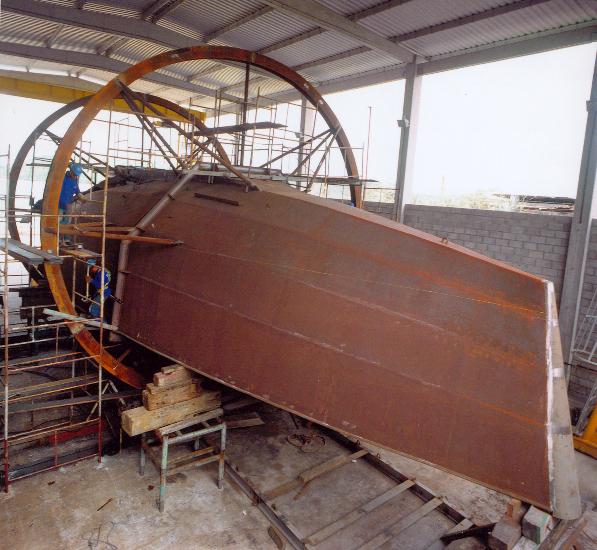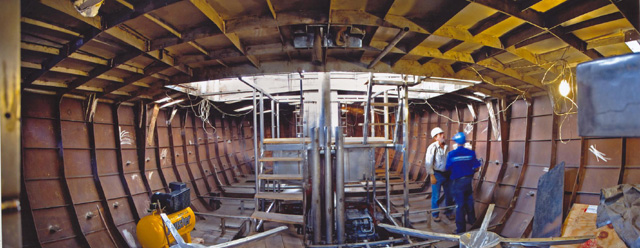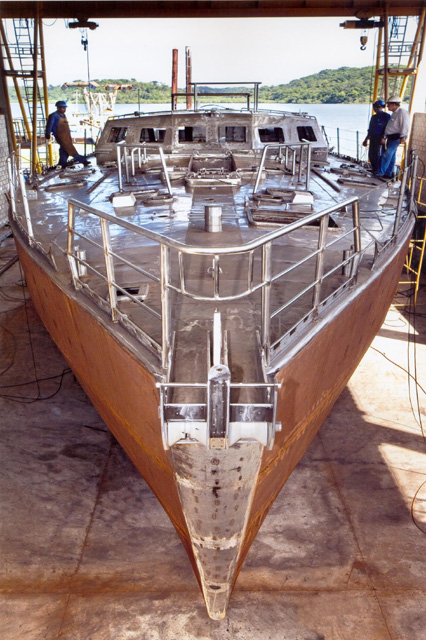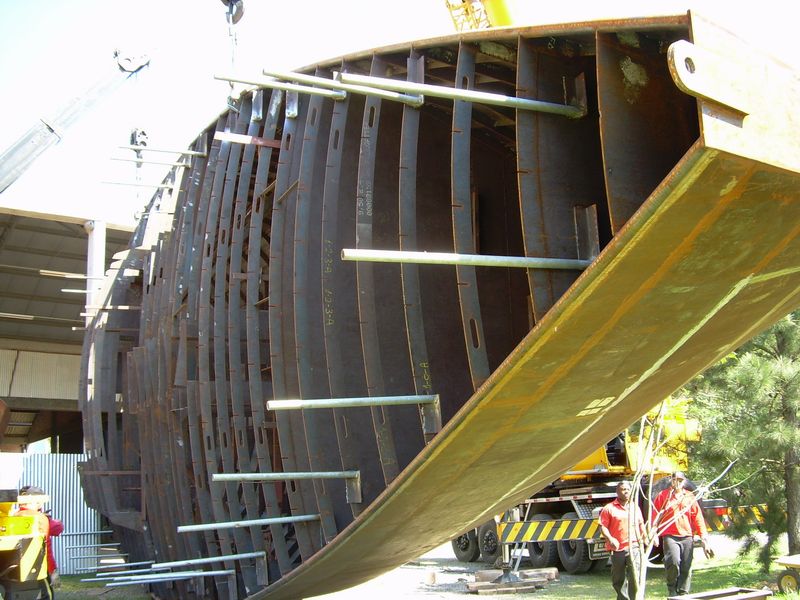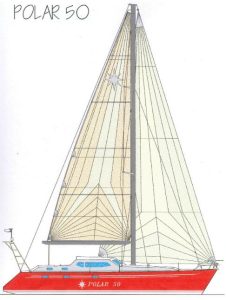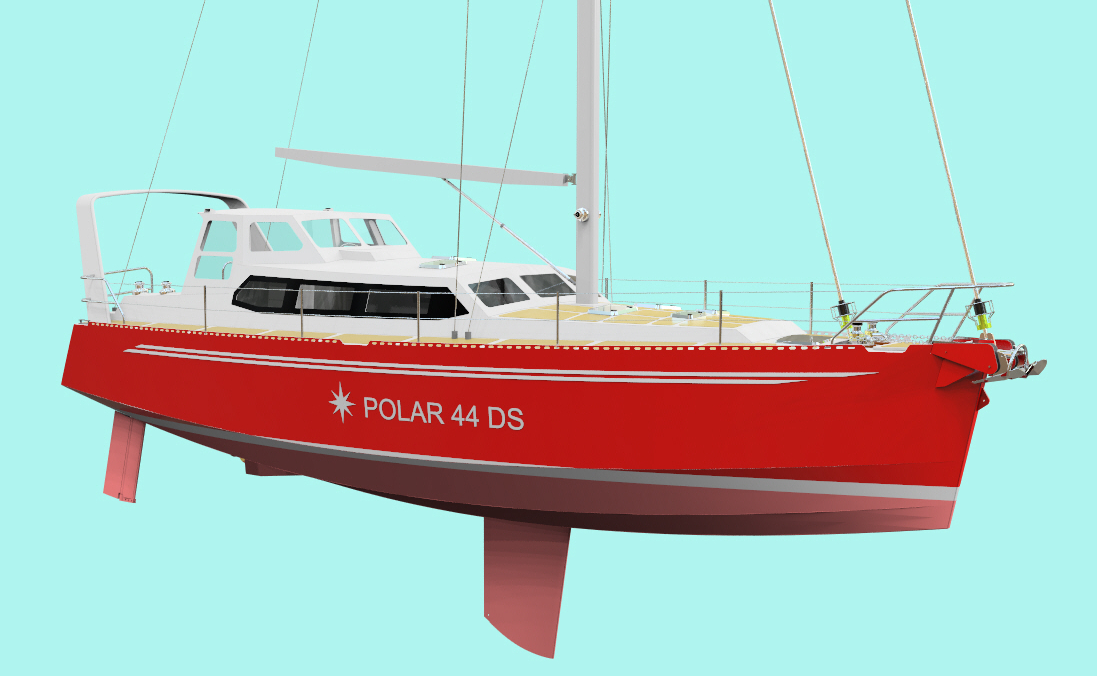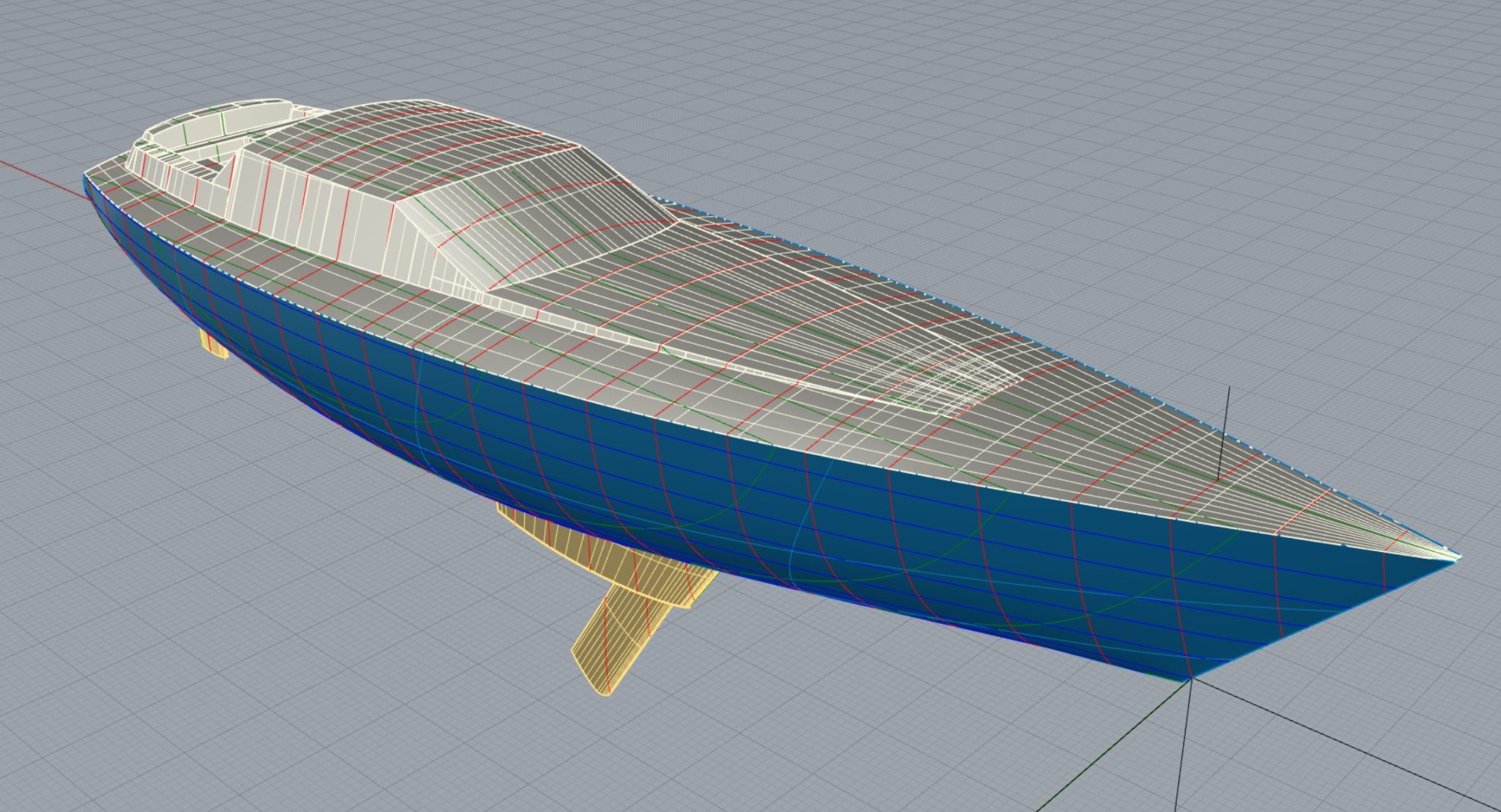Boat Plans - Polar 65
Swing keel expedition boat, specially designed for high latitude sailing.
Specially designed for high latitude sailing expeditions, the Polar 65 can accommodate up to 14 people for extended periods of time. The swing keel provides the benefit of reaching safe havens in shallow waters, safe from icebergs and heavy blocks of drifting ice.
An expedition yacht must be an overbuilt sailing machine, considering the harsh conditions encountered in the high latitudes and the absence of adequate facilities for repairs. Considering these factors and the importance of an easy grounding operation, we provided the design with two skegs, with apertures for the propellers leading to twin rudders, this way obtaining better manoeuvring ability, a stable base for grounding and extra protection for rudders and propellers.
The design is fitted with two engines, with the propellers aligned to the twin rudders what makes the boat extremely easy to steer, enables smaller propellers that are protected from damage by the skegs.
This is an ideal boat for scientific expeditions or for sustainable chartering business. The wind is the predominant source of power so you can reach remote locations without damaging the environment.
Technical Data
Length Overall
20.00 m (65’ 7”)
Length Waterline
17.65 m (57’ 11”)
Beam
6.67 m (21’ 11”)
Draft (keel up)
1.50 m (4’ 11”)
Draft (keel down)
4.50 m (14’ 9”)
Ballast
6,000 kg (13,215 lb)
Displacement (light)
50,000 kg (125,550 lb)
Headroom – Saloon
2.20 m (7’ 3”)
Headroom – Port Cabins
2.00 m (6’ 6”)
Headroom – Starboard corridor
2.20 m (7’ 3”)
Headroom – Galley
1.92 m (6’ 4”)
Headroom – Pilot House
1.86 m (6’ 1”)
Capacity Freshwater
4,000 l (1,056 gal)
Capacity Diesel
10,000 l (22,026 gal)
Sail Area
200 m2 (2,152 sq. ft.)
Diesel Engines
2 x 100 hp
Construction
Aluminium or Steel
Contact us if you are interested in the list of plans for the Polar 65.
Boat Description
The Polar 65 is intended to accommodate up to fourteen persons for extended periods. The keel case is placed at mid ships and for that reason the main saloon is shifted to the after quarters. This is the favourite arrangement among polar yacht owners. The large volume afforded when the design provides beamy quarters makes for an unobstructed saloon that is extremely spacious and can accommodate the whole crew plus guests.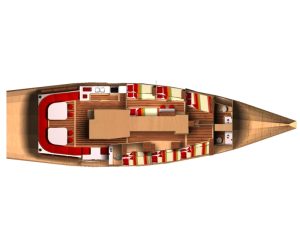
The U-shape sofa that surrounds the aft side of the saloon is served by two tables, a convenient arrangement once only one of these tables may be employed when shorthanded or taking shifts while sailing. At other occasions all seats may be occupied when the full crew is having their meals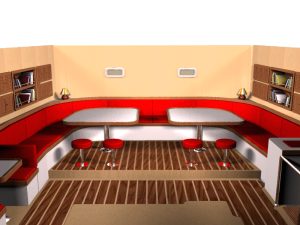
Frequently polar yachts are chartered by expedition parties or by documentary producers. For that matter, the Polar 65 reserves a noble place at the starboard side of the saloon for an ample communication centre or working area. Symmetrically, at port side, is located the galley with freezer, refrigerator, two sinks and a four-burner stove with oven. Besides there is a profusion of lockers for pantry and kitchen appliances to be stored.
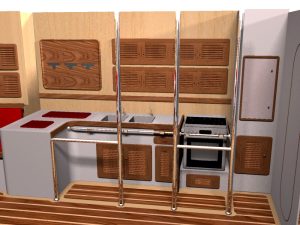
The floor at the working area is protected by a rail where the cook can lean his back against it, without risk of falling to leeward in case the two hands are required for the pots. The Engine Room separates the galley from the study.
The access for the engine room is by a hatch placed at the centre of the aft wall. To port there is a ladder to the pilothouse. This is a 360º visibility windowed compartment reserved for navigation and inside steering. A pilot settee berth provides a second social ambience for a small party. Talking to charter skippers, they pointed the importance of a second small resting area where a crew tired of all the fuss generated at the main saloon can find a quieter place to stay.
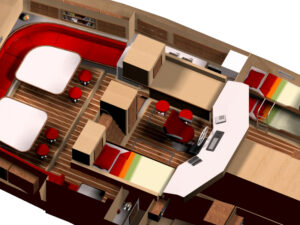
The wet suit locker is located at the aft wall of the pilothouse. This is a good place for this essential equipment once it avoids bringing water down below, besides being a handy place to dress before leaving the warmth of the heated interior. The companionway is placed at starboard and is shut by means of a deck type commercial hatch installed at a 45º angle fore and aft.
On top of this hatch is a solid dodger frame with extensive visibility through laminated glass windows that spares the crew from spray when getting out and to protect the pilot house from solid water going down below.
At each side of the engine room there are two corridors that give access to the living quarters located at both sides of the keel case. The stock plan considers the need to accommodate a large crew, and to fulfil this purpose, we designed a family cabin at port side with no less than five bunks, plus a working desk with stools.
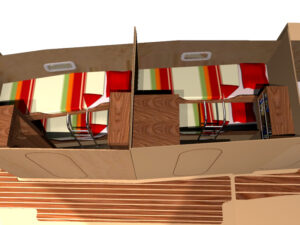
In front is the owner’s ensuite stateroom with two accesses, one by way of the starboard corridor and the second one provided by a door that leads to the large portside cabin. To starboard we designed two cabins with two berths each plus two berths for a professional crew, if wished. Another option is to build a workbench, what would be very handy for small maintenance jobs.
The two main heads are forward to each side of the anchor chain well and there is a third social head next to the communication centre. This is the most convenient position for a toilet, once it’s close to the centre of the boat.
In front of the two main heads is the foc`s`le, a watertight compartment accessible only from the deck. A steep ladder gives access to this ample compartment for storing extra gear such as spare sails, warps, chandlery, etc. A second generator, as well as a desalinator may also be installed there. A bow thruster is a recommended accessory that can be installed in this space. In front of the foc`s`le there is a collision bulkhead, with a watertight inspection port.
This interior arrangement is by no means a rigid one, except for keel case and structural bulkheads, everything can be designed to suit your specific needs. Contact us to discuss customisation.
The Polar 65 is a flush deck ketch with a pilothouse. Abaft the fore mast at centreline is located the cover for the swing keel case slot. This cover has a laminated glass port that allows visual inspection of the lifting operation from the main deck.
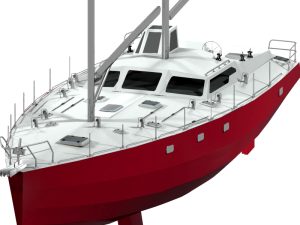
The fore deck, in front of the main mast, is a clean working area. The bollard, mid and fore stay chain plates and the electric windlass are fitted there. An 800 mm x 800 hatch provides access to the watertight foc´s´le. If a rigid bottom inflatable is to be carried aboard, the fore deck is the best place to stow it.
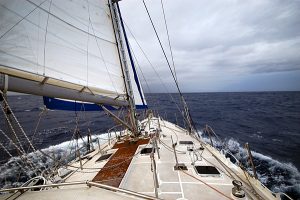
The cockpit is surrounded by a coaming except at the aft centre portion, which is open to the boarding platform, allowing water to drain out and giving a comfortable access to the boat. The outside steering wheel is placed to port at the fore side of the cockpit.
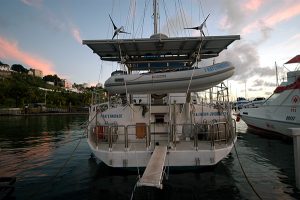
The boat is provided with hatches for the various compartments as well as cowl ventilators coupled with dorade boxes.
The Polar 65 is a cutter-rigged ketch. The emphasis of the design was focused on functionality and robustness. According to the opinion of the most experienced skippers that operate in Austral waters, double forestays, each one with its furler is the most practical way to handle fore sails.
The heavy weather jib is hooked to the mid stay instead of employing a furler. We opted for suppressing runners, bringing more simplicity to the manoeuvres, and in its place, we installed two permanent stays parallel to the aft lower shrouds. The ideal was to avoid swept back spreaders, this way keeping the main sail away from their tips. Once there are no overlapping foresails, shrouds chain plates are located close to the topsides saving the mast from excessive compression.
The mainsail has a raised tack and its traveller and sheet control are placed on top of the pilothouse coach roof. The main mast is back stayed by two independent wires. The mizzenmast has its own stays and profiting from the long stern scoop it’s served by two permanent backstays. Two other permanent fore stays and a jumper complete the mizzen mast support fore and aft.
The mizzen sheet is anchored to a pad eye on the cockpit floor and the control is from the pilothouses coach roof. On ocean crossings, as is the case with all ketches, a mizzen staysail may be employed, enriching the pleasure of sailing considerably.
The large swing keel yachts normally operate in areas where the sailing conditions are the most severe and absolute confidence in the system employed is fundamental.
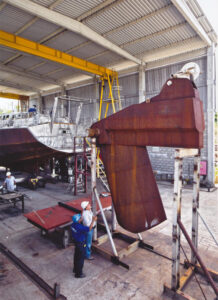
The Polar 65 keel is as efficient as the fixed fins found in modern cruising boats. We designed a steel case with an adequate hydrofoil shape filled with lead.
When the keel is down the gap in between the keel and the hull is closed by a beam that covers the root of the keel and extends to the after end of the keel box. At the front of this beam is the pivoting pin and lifting plate is attached to the rear end.
At the aft end of the keel runs in a ratch and pinion mechanism that will lock the moving keel at any height. This is a safety device that brings tranquillity when operating in remote regions under extremely rough conditions. Stability is enhanced by internal ballast.
The Polar 65 is propelled by two 100 hp diesel auxiliary engines. The shaft lines run inside skegs that are joined to the twin rudders, with apertures for the propellers. There is a vertical skeg in front of each of the rudders, for lighter steering ability.
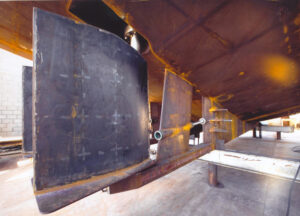
As these boats are intended to operate in regions where pack ice is a possibility we opted for “keel” cooling to refrigerate the engines as well as the generator. For that purpose, we used the skeg plates as heat exchangers, a very practical solution, considering the otherwise lost space inside those boxes.
The two rudders are rectangular in shape and both work in tandem providing more steering control, what’s highly desirable when sailing in rough sea conditions. The two steering wheels have hydraulic and wire transmission, what means plenty of redundancy in case of failure.
Boat Plans
Browse Gallery
See Related Plans

